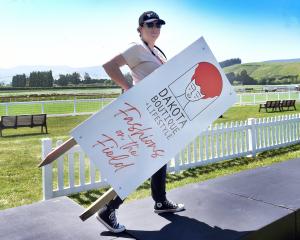A Kiwi freediver aims to smash his own world record when he plummets 102m into a cavern off the Bahamas tomorrow morning.
William Trubridge, 34, world champion and double world record-holding freediver, is the world's best free immersion diver, and also holds the record for the "constant weight without fins" discipline.
In the constant weight without fins dive, freedivers descend and ascend under water using only their own strength. They have no propulsion equipment and cannot pull on a rope, according to international diving association AIDA.
Trubridge broke the world record in December 2010, reaching 101m.
The former Havelock North High School student was keeping fans updated online this week, as he prepared for the breathtaking feat.
On Sunday, Trubridge made a clean dive to 94m in 3 minutes and 42 seconds.

Trubridge has achieved wide support. All Blacks flanker Liam Messam sent Trubridge a message of support on YouTube, joking the freediver should bring him "a few kina" on the way up.
Trubridge set the current world record four years ago during Project Hector, an event aimed at raising awareness of the plight of the critically endangered Hector's and Maui's dolphin species.
"We can't be an animal like a dolphin or a whale but we share a lot of similarities with them, physiologically," Trubridge told the Weekend Herald last month.
"I try not to think about beating someone else or even breaking my own record so much as the process and doing a technically perfect dive and focusing on what I need to do at that moment."
Trubridge has broken various freediving world records 15 times.
He also founded the Vertical Blue school and annual freediving event on Long Island, Bahamas.
On his personal website, the champion said he learned to swim at the age of 18 months, and was freediving to 15m by the time he was 8.
Yesterday, Trubridge said he didn't fear for his life, but was aware of the immensity of the challenge.
"I trust the safety systems we have, the safety divers," he told TVNZ's Breakfast show. "But there's always that anxiety around - Am I going to make it? Am I going to black out? And you need to quell that as much as possible."
Professor Des Gorman, a specialist in treating decompression sickness, which can affects divers, said the pressure at 100m deep is about 11 times normal atmospheric pressure.
Trubridge's ears and lungs would be at risk of damage because of the compression of the gases in them and he would also be at risk of decompression sickness.
"His major risk is running out of oxygen. If you run out of oxygen you become unconscious and very quickly. That will happen to him coming back to the surface."
Because he is holding his breath, his body simply runs out of oxygen as it is used up in his muscles and brain. Free divers try to minimise their oxygen use rate by relaxation and minimising physical effort.
- New Zealand Herald
• Trubridge's world record-breaking attempt will be broadcast on Breakfast on TV One from 8.15am tomorrow.












